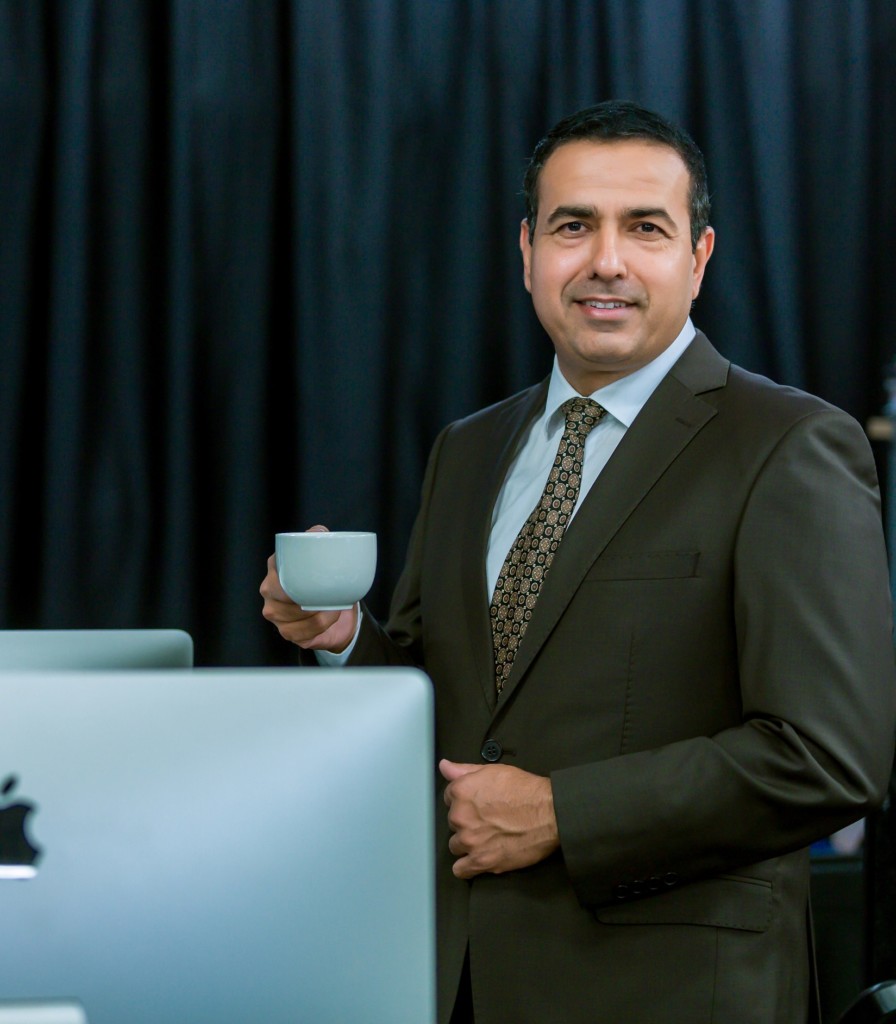For this week’s Alumni Profile, I had the pleasure of talking to Khawar Saleem, who is a Director, Enterprise Architect (EA) in the NSW Department of Education.
Education is one of the main pillars of any successful society, and so, designing for education is of utmost importance. In this interview, showing his sense of humour, Saleem speaks about innovation, Design Thinking, designing for education and the possibility of a new career in acting.
RG- Hello, Khawar! Can we start by telling our readers a little bit about yourself?
KS- I work as Director, Enterprise Architect (EA) in the NSW Department of Education. Before EA, and even before I got into the computer game, I went through a lifetime of professional incarnations. I’ve done scientific work, technical sales and marketing for a couple of multinationals for a number of years and a handful of other things related to science and technology marketing. I play squash and cricket, love to travel, speak fluently in my own sweet accent, wage a mean game of chess, can play cards and many other games – minus the mind games (laughs). I used to be a professional student, well; that’s how you feel after doing three masters. However, it became my downfall especially in deciding not to pursue my well-planned PhD, when I got sick of doing assignments, research thesis and projects. Ever since my initiation into the world of prestidigitator manipulations, I’ve never been able to embrace a normal lifestyle – or was it the existential phenomenology? I’m very lucky to have some very good, sincere & creative friends and for peace of mind from the everyday hustle-bustle, I spend a lot of time listening to my favourite music, which is better than growing vegetables!
RG- That’s quite the resume! Could you describe your day job?
KS- As an Enterprise Architect, I translate the organisation’s vision into ICT strategies and futuristic designs through “Target state architecture” for the organisation. I also participate in governance activities to make sure that all solution designs and project architectures comply with these strategies and future states. I also conduct industry exploration and attend technology forums to gain an understanding of new trends in technology so that I can help management and CIO to make important technology plans and decisions.
“Innovation is not only about new inventions but also doing the same thing in a better way and in a more innovative way.”
RG- In your opinion, in today’s society – and your field of work – what is the importance of innovation?
KS- In today’s world, where time is the most precious commodity and in this era of mobile and digital, users and customers have very high expectations. In public service with limited resources in people, technology and budget, we have to be efficient and very effective in the ways we work and deliver services to citizens, students, parents and the public. Innovation is key for such efficiencies, especially in developing future strategies. My futuristic strategies need to make sure that our ICT and technology is keeping up with the times and improving the ways we are already performing. Innovation is not only about new inventions but also doing the same thing in a better way and in a more innovative way.
RG- Absolutely. I’m curious to know; when was the first time you heard about Design Thinking?
KS- Being an Enterprise Architect, Design Thinking is not a new concept, however with the focus on less documentation and more agile ways of working arising recently, the need for Design Thinking has become more important. Human-centred designs are the key, where a design is a part of the customers need and not just a mean to the delivery of this need.
“This course made me realise how important empathy and user insights are in implementing a useful and effective design.”
RG- You are part of Echos’ alumni, having participated in the Design Thinking Experience course. How do you think the knowledge you brought back to your work can positively impact your industry?
KS- It was quite refreshing to participate in hands-on exercises and sessions! Often in the IT world, when designing solutions, we forget about the human factor. This course made me realise how important empathy and user insights are in implementing a useful and effective design. The tools provided and the time-based experimentation in prototype building were not only an excellent way to divide and concur but also combine the individual thinking and prototypes into solutions. I have explained this to different stakeholders and will be developing a pack to promote this practice.
RG- That’s exciting that you now get to share the knowledge. Can you think of any big learnings you had during the Echos’ Design Thinking course?
KS- “Questioning the questions”, “Empathy Map” and “Insights” were important parts of Echos’ Design Thinking methodology. The tools make it really easy to follow the methodology and help in following the Double Diamond process.
RG- And on a personal level; did you learn anything new about yourself?
KS- Yes, I think I can be creative and have been told that I can do role play really well! Maybe it is the start of my new acting career?
RG- (Laughs) I’ve seen you in action, you do have the talent for it! Changing gears a little, I wanted to know if you are currently applying Design Thinking methodologies to any of your projects.
KS- Yes, I am working on a number of projects relating to digital experience platform, and I am also involved in developing a digital transformation strategy. The Design Thinking methodology is the core of this project where we are working towards providing innovative personalised solutions for teachers and other staff. These personalised solutions will help them in spending less time on administrative activities and focus more on their primary roles, which are teaching and planning lessons.
“Innovation doesn’t have to start with a complete solution to a problem; rather it should start with a complete understanding of your customer, the blockers and the drivers they face in achieving their goals.”
RG- What pearls of wisdom would you share with someone who is starting their innovation journey through Design Thinking?
KS- Innovation doesn’t have to start with a complete solution to a problem; rather it should start with a complete understanding of your customer, the blockers and the drivers they face in achieving their goals. Knowing your customer through an empathy map and customer insight is a great start.
“Learning while having fun was a great experience.”
RG- As we approach the end of the interview, is there anything else you’d like to share about your experience?
KS- Echos has a small team but with impressive people in it, with really good skills. They created an environment in which everyone was comfortable to share anything on their minds. The program is full of activities that keep you busy, and it is fun all the way. Learning while having fun was a great experience.
RG- To finalise, could you share a quote that inspires you?
KS- A quote by me: “Diversity is not just about having different genders and ethnicities at your workplace; it is also about accepting their way of working or new styles of working.” Also, “A trust leap happens when we take the risk to do something new or different to the way we’ve always done it”, by Rachel Botsman.
RG- Thank you, Khawar!
KS- Thank you.
—
Follow us on social
Instagram – Facebook – LinkedIn – Youtube
How Can We Help?
- For training and Innovation Journeys in your company: check out our in-house course offering.
- For upcoming courses in your region: visit our website.
- For upcoming events in your region: look at our event calendar.
- If you have a special project and would like to use Echos’ consultancy services: send us an email.
Want to speak to a real person? Call us on 1300 502 006



